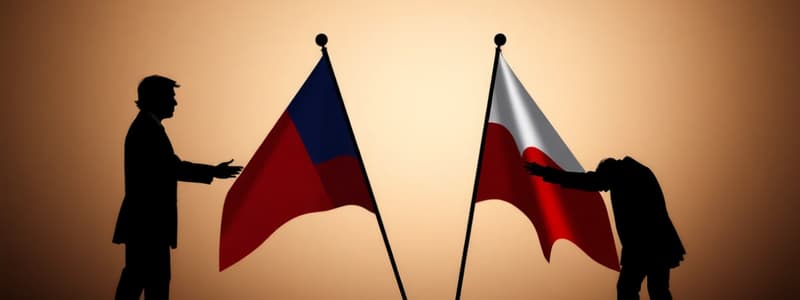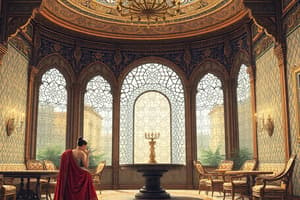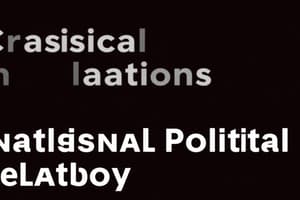Podcast
Questions and Answers
Briefly explain how the security dilemma, as described by realists, can lead to an arms race between two states, even if neither state initially desires conflict.
Briefly explain how the security dilemma, as described by realists, can lead to an arms race between two states, even if neither state initially desires conflict.
When one state increases its military capabilities to enhance its security, it can be perceived as a threat by another state. This can lead the second state to increase its own military capabilities, resulting in a cycle of escalation, or an arms race.
How does economic interdependence, a core concept in liberalism, promote peace between states?
How does economic interdependence, a core concept in liberalism, promote peace between states?
Economic interdependence creates mutual benefits and costs associated with conflict. States that are economically intertwined are less likely to engage in conflict because war would disrupt trade, investment, and other economic activities, harming both sides.
According to constructivism, how do shared ideas and norms shape the interests and behaviors of states in the international system?
According to constructivism, how do shared ideas and norms shape the interests and behaviors of states in the international system?
Constructivism argues that state interests and behaviors are not predetermined. They are shaped by shared ideas, norms, and identities. These factors influence how states perceive each other, define their interests, and determine appropriate courses of action.
Explain how dependency theory, a key concept within Marxism, elucidates the economic relationship between developed and developing countries.
Explain how dependency theory, a key concept within Marxism, elucidates the economic relationship between developed and developing countries.
How does feminist IR theory challenge traditional understandings of security in international relations?
How does feminist IR theory challenge traditional understandings of security in international relations?
Differentiate between the core assumptions of realism and liberalism regarding the nature of states and the international system.
Differentiate between the core assumptions of realism and liberalism regarding the nature of states and the international system.
In what ways might a constructivist scholar critique the realist concept of national interest?
In what ways might a constructivist scholar critique the realist concept of national interest?
How does Marxism explain the phenomenon of imperialism?
How does Marxism explain the phenomenon of imperialism?
What are the central tenets of Immanuel Kant's theory of 'perpetual peace', and how do they relate to liberal IR theory?
What are the central tenets of Immanuel Kant's theory of 'perpetual peace', and how do they relate to liberal IR theory?
Explain how the concept of 'intersectionality' informs feminist analyses of international relations.
Explain how the concept of 'intersectionality' informs feminist analyses of international relations.
Flashcards
International Relations (IR)
International Relations (IR)
Interactions between states and non-state actors in the international system.
Realism in IR
Realism in IR
Theory emphasizing power and self-interest as primary drivers in international politics.
Security Dilemma
Security Dilemma
Situation where one state's security measures provoke insecurity in others, leading to escalation.
Liberalism in IR
Liberalism in IR
Signup and view all the flashcards
Collective Security
Collective Security
Signup and view all the flashcards
Constructivism in IR
Constructivism in IR
Signup and view all the flashcards
Social Construction
Social Construction
Signup and view all the flashcards
Marxism in IR
Marxism in IR
Signup and view all the flashcards
Imperialism
Imperialism
Signup and view all the flashcards
Feminist IR Theory
Feminist IR Theory
Signup and view all the flashcards
Study Notes
- International relations (IR) is a field of political science that studies the interactions between states and non-state actors in the international system
- It encompasses a wide range of topics, including diplomacy, war, trade, foreign policy, international organizations, and global issues such as human rights and environmental protection
- Various theories and concepts are used to analyze and understand international relations
Realism
- Realism is a dominant theory in IR, emphasizing the role of power and self-interest in international politics
- Key assumptions include:
- States are the primary actors and are rational
- The international system is anarchic, meaning there is no overarching authority
- States pursue their own self-interest, primarily survival and security
- Power is the most important factor in international relations
- Core concepts include:
- Balance of power: states seek to maintain a distribution of power that prevents any one state from dominating the system
- Security dilemma: a situation in which one state's efforts to increase its security can lead other states to feel less secure, resulting in an arms race
- National interest: the goals and objectives that states pursue in their foreign policy
- Prominent thinkers include:
- Hans Morgenthau: emphasized the pursuit of power as the driving force in international politics
- Kenneth Waltz: developed neorealism or structural realism, focusing on the structure of the international system
Liberalism
- Liberalism offers an alternative perspective to realism, emphasizing the importance of cooperation, international institutions, and the spread of democracy
- Key assumptions include:
- States are important but not the only actors; non-state actors such as international organizations and multinational corporations also play a significant role
- States can cooperate and achieve mutual benefits
- Democracy promotes peace
- International law and institutions can facilitate cooperation
- Core concepts include:
- Collective security: a system in which states agree to collectively defend each other against aggression
- International law: a set of rules and norms that govern the interactions between states
- Economic interdependence: the mutual dependence of states on each other for trade and investment which promotes peace
- Democracy is more peaceful than non-democracy
- Prominent thinkers include:
- Immanuel Kant: advocated for a "perpetual peace" based on democracy, international law, and economic cooperation
- Woodrow Wilson: promoted the League of Nations after World War I
Constructivism
- Constructivism emphasizes the role of ideas, norms, and identities in shaping international relations
- Key assumptions include:
- International relations are socially constructed, meaning they are shaped by shared beliefs and practices
- Identities and interests of states are not fixed but are shaped by social interactions
- Norms, or shared expectations about appropriate behavior, can influence state behavior
- Core concepts include:
- Social construction: the process by which ideas, norms, and identities are created and reproduced through social interactions
- Identity: a sense of self based on shared characteristics, such as nationality, ethnicity, or religion
- Norms: shared expectations about appropriate behavior
- Ideas: beliefs and values that shape how actors understand their interests and the world around them
- Prominent thinkers include:
- Alexander Wendt: argued that anarchy is what states make of it, meaning that the nature of international relations depends on how states perceive and interact with each other
Marxism
- Marxism focuses on the role of economic factors and class relations in shaping international relations
- Key assumptions include:
- The international system is characterized by inequalities and exploitation
- States act in the interests of the ruling class
- Capitalism leads to imperialism and conflict
- Core concepts include:
- Imperialism: the expansion of capitalist states into other parts of the world to exploit resources and labor
- Dependency theory: the idea that developing countries are dependent on developed countries due to historical and economic factors
- World-system theory: views the world as a single capitalist system with a core, periphery, and semi-periphery
- Prominent thinkers include:
- Karl Marx: analyzed the dynamics of capitalism and its impact on society
- Vladimir Lenin: developed the theory of imperialism as the highest stage of capitalism
Feminism
- Feminist IR theory examines the role of gender in shaping international relations
- Key assumptions include:
- Gender is a social construct that influences how individuals and states behave
- Traditional IR theories are often gendered and biased
- Women are often excluded from decision-making processes in international relations
- Core concepts include:
- Gender: the social construction of differences between men and women
- Patriarchy: a system of social relations in which men dominate women
- Intersectionality: the interconnected nature of social categorizations such as gender, race, and class
- Feminist IR scholars analyze a variety of topics, including:
- The role of women in peacebuilding
- The gendered impact of war
- The construction of masculinity in international politics
- Human Rights
Other Theories and Approaches
- Other theories and approaches to IR include:
- Post-structuralism: challenges mainstream IR theories and emphasizes the role of language, discourse, and power in shaping international relations
- Green theory: focuses on the relationship between humans and the environment and advocates for sustainable development and environmental protection
- Critical theory: examines the role of power and knowledge in shaping international relations and seeks to challenge dominant narratives and promote social justice
- Game theory: applies mathematical models to analyze strategic interactions between states
Studying That Suits You
Use AI to generate personalized quizzes and flashcards to suit your learning preferences.
Description
Explanation of realism, a dominant theory in International Relations (IR). This theory emphasizes power and self-interest in international politics, assuming states are primary, rational actors pursuing their own survival in an anarchic system. Key concepts include the balance of power.




